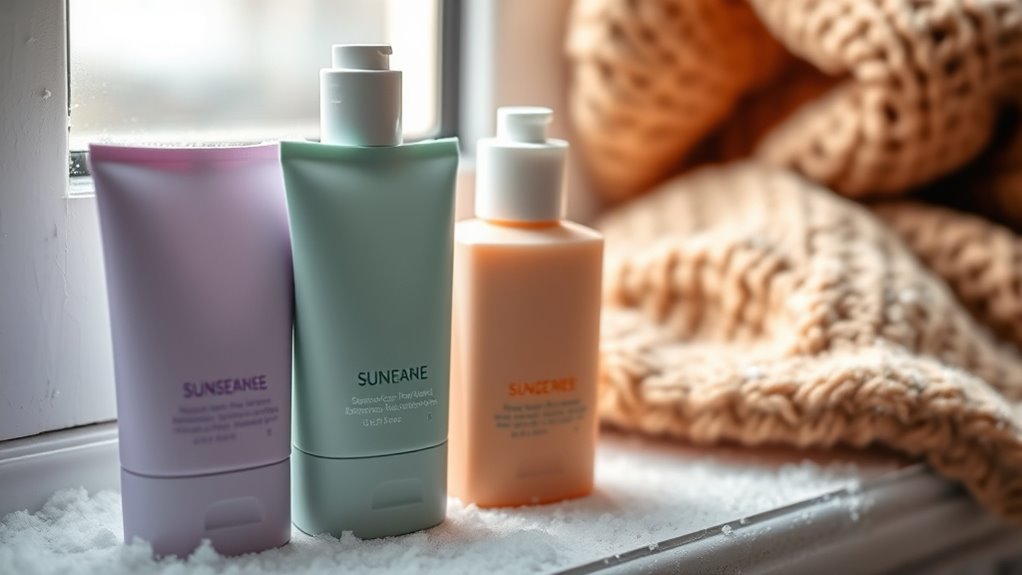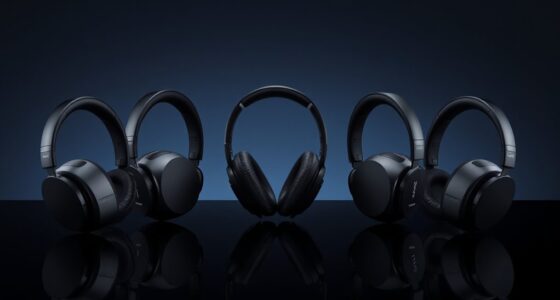If you’re looking for the best Korean sunscreens for winter, I recommend the lightweight, essence-like ROUND LAB Birch Juice Moisturizing UV LOCK SPF 45 for hydration and a natural glow, Derma B SPF50+ Sunblock for maximum protection with a non-sticky finish, and COSRX Vitamin E Face Sunscreen SPF 50 to control oil while keeping your skin protected. These options suit dry or sensitive skin and prevent white cast. Keep going, and you’ll discover how to choose the perfect winter sunscreen for your skin.
Key Takeaways
- Choose lightweight, essence- or lotion-like sunscreens for seamless, non-greasy application during cold, dry winter months.
- Opt for SPF 30-50+ with broad-spectrum protection to guard against UV rays reflected by snow and clouds.
- Prioritize hydrating formulas with ingredients like hyaluronic acid and aloe vera to prevent dryness and irritation.
- Select sunscreens with minimal white cast, transparent finishes, and easy blending for a natural look.
- Look for gentle, sensitive-skin formulas free from irritants, ensuring daily comfort and effective winter skin protection.
ROUND LAB Birch Juice Moisturizing UV LOCK SPF 45 Sunscreen (1.69 Fl Oz)
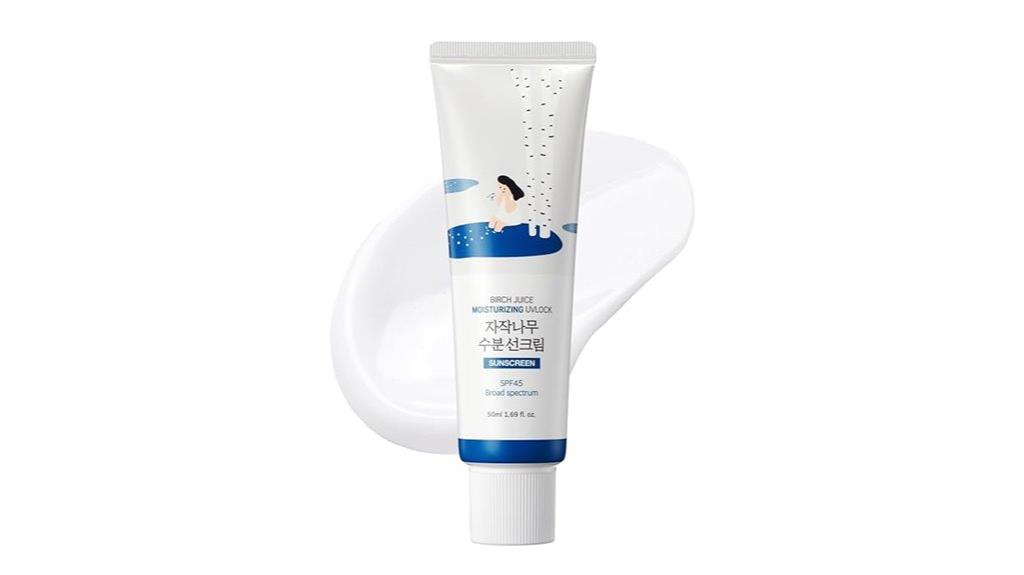
If you have sensitive or acne-prone skin and are looking for a lightweight, hydrating sunscreen for winter, Round Lab Birch Juice Moisturizing UV LOCK SPF 45 is an excellent choice. I love how its essence-like, non-greasy texture glides on smoothly, leaving no white cast. It provides broad-spectrum SPF 45 protection while maintaining a natural, glowing finish. Plus, it’s fragrance-free, safe for sensitive skin, and free from harmful ingredients. I appreciate that it feels breathable and comfortable all day, making it perfect under makeup or alone. This trusted, dermatologist-tested sunscreen delivers hydration and protection without irritation, ideal for everyday winter skincare.
Best For: individuals with sensitive or acne-prone skin seeking a lightweight, hydrating, and protective sunscreen suitable for daily use, especially in winter.
Pros:
- Fragrance-free and formulated for sensitive skin, reducing risk of irritation
- Provides broad-spectrum SPF 45 protection with a natural, glow finish without white cast
- Lightweight, essence-like texture that feels breathable and comfortable all day
Cons:
- May require reapplication throughout the day for extended sun exposure
- Slightly smaller size (1.69 Fl Oz) may necessitate frequent repurchasing for daily use
- Doesn’t contain additional skincare benefits like anti-aging or antioxidant ingredients
Derma B SPF50+ Sunblock, 6.71 Fl Oz
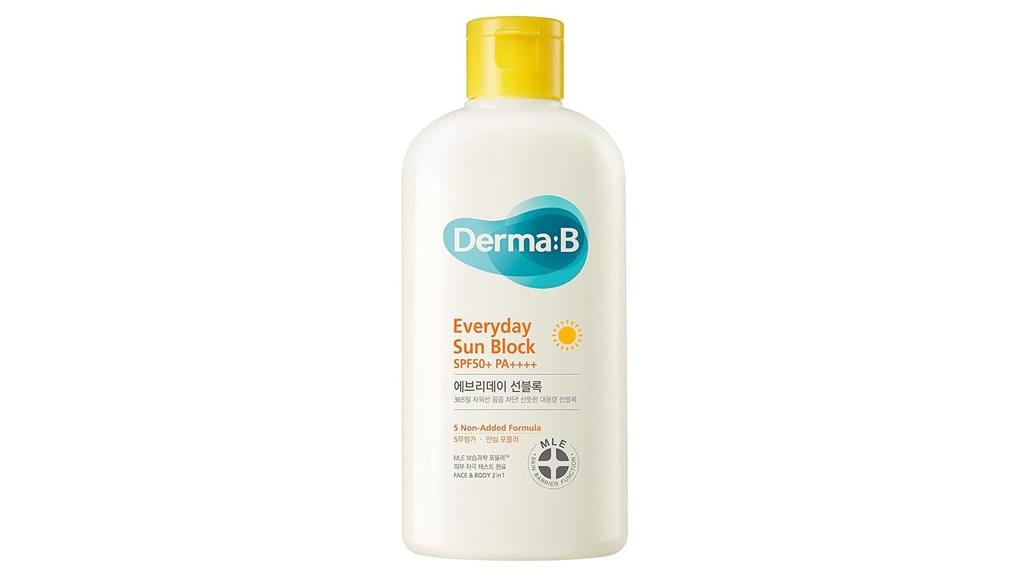
Derma B SPF50+ Sunblock stands out as an ideal choice for families seeking reliable sun protection during winter, thanks to its large 6.71 Fl Oz size that covers both face and body. Its light, fast-absorbing lotion feels non-sticky and provides a dewy finish, making it perfect for everyday use. It contains soothing ingredients like cactus fruit, guarana, and cucumber to hydrate and calm the skin. Utilizing advanced MLE technology, it absorbs quickly without white cast or residue. Free from harmful ingredients and tested for sensitivity, it’s safe for all ages, including babies. Reapply every two hours for continuous protection during outdoor activities.
Best For: families and individuals seeking reliable, gentle, and easy-to-apply sun protection suitable for all ages, including babies, during outdoor activities in any season.
Pros:
- Provides high SPF50+ PA++++ protection with broad-spectrum UV defense.
- Light, fast-absorbing, non-sticky lotion that leaves a dewy finish.
- Contains soothing and hydrating ingredients like cactus fruit, guarana, and cucumber, suitable for sensitive skin.
Cons:
- Requires reapplication every 2 hours for optimal protection, which may be inconvenient.
- Large size may be less portable for on-the-go touch-ups.
- As a lotion, it may take longer to fully absorb compared to sprays or gels.
COSRX Vitamin E Face Sunscreen SPF 50
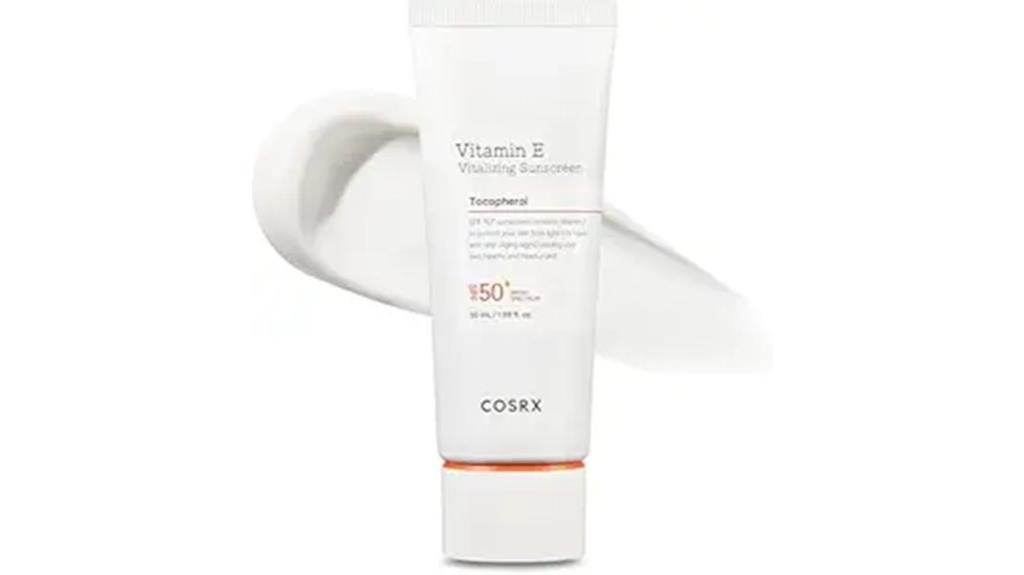
COSRX Vitamin E Face Sunscreen SPF 50 stands out as an excellent choice for those with oily or combination skin seeking reliable sun protection during winter. This lightweight formula offers broad-spectrum SPF 50, shielding skin from UVA and UVB rays while controlling excess oil with a semi-matte finish. Enriched with Vitamin E, cacao, and cotton, it strengthens skin, fights aging signs, and reduces redness. Its smooth texture applies easily without whitecast, making it perfect under makeup or alone. hypoallergenic and free from harmful ingredients, it’s a versatile, skin-friendly option that keeps your skin protected and glowing even in cold weather.
Best For: individuals with oily or combination skin seeking reliable, lightweight sun protection during winter, especially under makeup or for daily outdoor use.
Pros:
- Provides broad-spectrum SPF 50 protection effectively shielding skin from UVA and UVB rays.
- Controls excess oil and offers a semi-matte finish suitable for oily and combination skin types.
- Enriched with skin-strengthening ingredients like Vitamin E, cacao, and cotton, which help fight aging signs and reduce redness.
Cons:
- May feel too lightweight or less moisturizing for very dry or sensitive skin types.
- As a chemical sunscreen, some users may experience irritation if they have highly sensitive skin.
- The semi-matte finish might not provide enough dewy glow for those preferring a luminous look.
Factors to Consider When Choosing Korean Sunscreen for Winter
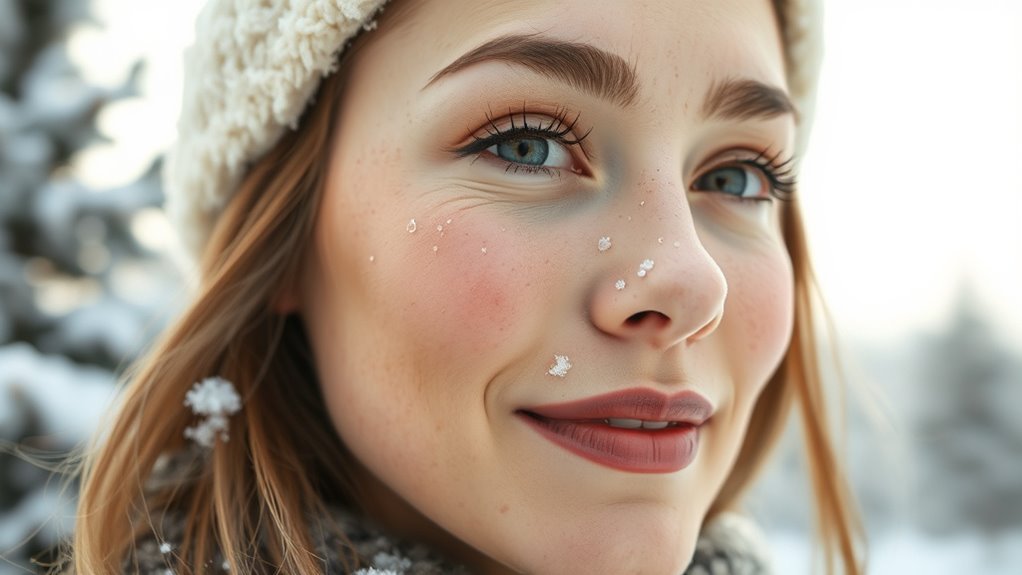
When choosing a Korean sunscreen for winter, I look at the SPF level to guarantee adequate protection without overdoing it. I also consider its moisturizing benefits and how well it suits my skin sensitivity. Additionally, I pay attention to the texture, finish, and whether it leaves a white cast, so it feels comfortable and looks natural on my skin.
SPF Level Adequacy
Choosing the right SPF level for winter depends on how much sun exposure you’ll experience and your skin’s sensitivity. For everyday outdoor activities, SPF 30 provides broad UV protection and is usually sufficient. However, if you’re spending extended time outside, especially in regions with reflected sunlight or higher UV indices, SPF 50 or higher offers extra defense against UVB rays. Those with sensitive or fair skin that burns easily should consider SPF 50+ to prevent sun damage. While SPF effectiveness remains consistent year-round, reapplying sunscreen is vital in winter due to lower temperatures and potential UV exposure. For daily use, a sunscreen with SPF 45 or above balances protection with a lightweight feel, ensuring your skin stays protected without heaviness or greasiness.
Moisturizing Benefits
As the winter chill saps moisture from our skin, selecting a Korean sunscreen with moisturizing benefits becomes increasingly important. Moisturizing sunscreens contain hydrating ingredients like glycerin, hyaluronic acid, and plant extracts that help maintain skin hydration in cold, dry conditions. Their formulations create a barrier that prevents moisture loss while shielding against UV rays. Since skin tends to be drier in winter, choosing a sunscreen with added emollients can soothe irritation and prevent dryness. Ingredients such as aloe vera, ceramides, and botanical extracts support and strengthen the skin’s natural moisture barrier. Using a sunscreen with moisturizing benefits reduces the risk of dehydration, flakiness, and irritation, ensuring your skin stays comfortable, healthy, and protected during the harsh winter months.
Skin Sensitivity Compatibility
Selecting a Korean sunscreen for winter requires careful attention to skin sensitivity, especially since colder months can heighten irritation. I recommend choosing products labeled as suitable for sensitive skin, often indicated by hypoallergenic or dermatologist-tested labels. Check the ingredient list for avoidable irritants like alcohol, artificial fragrances, parabens, or artificial colors, which can worsen winter dryness and sensitivity. Look for soothing ingredients such as aloe vera, centella, or cucumber, which help reduce irritation. It’s also important to select a gentle, non-comedogenic formula that won’t clog pores or cause breakouts, especially in sensitive skin. Finally, make certain the sunscreen offers broad-spectrum SPF protection with low irritation potential, as skin tends to be more vulnerable in cold weather. Your skin’s comfort and safety should always come first.
Texture and Finish
During winter, the texture and finish of your sunscreen can make a significant difference in how comfortable and effective your skincare routine feels. I prefer lightweight, non-greasy formulas to avoid that heavy, sticky sensation on my skin. A natural, glow finish helps enhance radiance without leaving a white cast, which is especially important in colder months when skin can look dull. I look for essence-like or lotion-like textures because they apply seamlessly on dry or sensitive skin, making my routine feel effortless. A semi-matte or dewy finish complements winter skincare and layering with makeup. Most importantly, the texture should allow easy application and layering without feeling heavy, ensuring my skin stays comfortable and protected throughout the day.
White Cast Avoidance
Choosing a Korean sunscreen that minimizes white cast is essential for a natural, seamless look in winter. I look for products with a lightweight, lotion-like texture and a transparent or semi-matte finish, which blend easily without leaving a visible residue. Sunscreens with micronized or chemical filters tend to produce less white cast than those with mineral filters like zinc oxide or titanium dioxide. Labels such as “makeup-friendly” or “transparent” are good indicators that the product will blend well. Some formulations include skin-nude pigments or color-correcting properties, helping reduce white cast on various skin tones. Before applying, I always test a small patch to ensure it won’t leave a noticeable white cast, especially if I have darker skin. This step helps me find a perfect match for a natural look.
Broad-Spectrum Protection
Even in winter, UV rays remain a threat to our skin, so it’s vital to pick a Korean sunscreen that offers broad-spectrum protection. This means it shields us from both UVA rays, which cause aging, and UVB rays, responsible for sunburn. Even on cloudy days, UV rays can penetrate clouds and reflect off snow, so broad-spectrum coverage is indispensable year-round. Look for sunscreens with ingredients like zinc oxide or avobenzone, as these provide effective protection against both UVA and UVB rays. Remember, SPF alone doesn’t guarantee UVA protection—check for labels that specify broad-spectrum or UVA/UVB protection. Consistently using a broad-spectrum sunscreen helps prevent skin damage and premature aging caused by winter UV exposure, keeping your skin healthier and more youthful.
Ease of Application
When selecting a Korean sunscreen for winter, ease of application is key to ensuring consistent protection. I look for sunscreens with a lightweight, lotion-like texture that spreads easily and quickly over my skin, making application effortless. It’s important that the formula doesn’t require vigorous rubbing, especially since winter skin can be sensitive and prone to irritation. I prefer products that absorb rapidly without leaving a white cast, so I can achieve a natural finish whether I’m indoors or outdoors. Additionally, sunscreens formulated with moisturizing ingredients help keep my skin hydrated during the dry winter months. Finally, I opt for make-up friendly options that blend seamlessly into my daily routine without feeling heavy or greasy. This way, I stay protected and comfortable all day.
Suitable for Daily Use
A Korean sunscreen suitable for daily winter use should provide at least SPF 30 to shield against both UVA and UVB rays, ensuring consistent protection throughout the day. It needs a lightweight, non-greasy texture that feels comfortable and doesn’t clog pores, making it easy to incorporate into your routine. The formula should be gentle, non-irritating, and suitable for sensitive skin, so it won’t cause redness or discomfort. Fragrance-free and free from harsh chemicals are essential to minimize skin reactions, especially in cold weather when skin can be more vulnerable. Additionally, the sunscreen should apply smoothly over moisturizer and under makeup without leaving a white cast or residue, so your skin looks and feels natural all day long.
Frequently Asked Questions
How Often Should I Reapply Sunscreen During Winter Days?
You should reapply sunscreen every two hours during winter days, especially if you’re outdoors or near reflective surfaces like snow. Even in cold weather, UV rays can damage your skin, so staying protected is essential. I make it a habit to reapply after sweating or wiping my face, ensuring continuous coverage. Don’t forget to choose a broad-spectrum sunscreen suitable for winter conditions to keep your skin safe and healthy.
Are There Specific Ingredients to Look for in Winter Sunscreens?
Yes, I look for ingredients like hyaluronic acid and glycerin in winter sunscreens because they hydrate and protect my skin from dryness. I also check for broad-spectrum UV filters like zinc oxide or titanium dioxide, which shield against UVA and UVB rays. Additionally, antioxidants like vitamin C or green tea extract help combat cold weather stress. These ingredients keep my skin nourished, protected, and healthy during chilly days.
Can Korean Sunscreens Be Used Under Makeup in Cold Weather?
Think of Korean sunscreens as a smooth base coat for your makeup—absolutely perfect for winter. Yes, they can be used under makeup in cold weather. I find they create a seamless layer, helping my foundation go on evenly and stay put longer. Just choose a lightweight, hydrating formula with good SPF, and you’re ready to face the cold without sacrificing your makeup’s finish or protection.
How Does Cold Weather Affect Sunscreen Effectiveness?
Cold weather can decrease sunscreen effectiveness because low temperatures and humidity can cause the product to become less stable or less evenly spread on your skin. I’ve noticed that in winter, I need to reapply sunscreen more often, especially if I’m outdoors or facing wind and cold. It’s essential to choose a sunscreen with good stability and to reapply regularly, even when it’s chilly, to guarantee your skin stays protected.
Is Mineral or Chemical Sunscreen Better for Winter Skin?
I find mineral sunscreens better for winter skin because they create a physical barrier that reflects UV rays, making them effective even in cold, snowy conditions. Plus, they tend to be gentler on sensitive winter skin and don’t clog pores. Chemical sunscreens can sometimes cause irritation or breakouts, especially when your skin is dry and vulnerable. So, I opt for mineral options to stay protected and comfortable during winter months.
Conclusion
Remember, the right sunscreen is your best armor against winter’s chill. Whether you choose ROUND LAB’s moisturizing formula, Derma B’s broad protection, or COSRX’s vitamin E boost, each offers solid defense. As the saying goes, “Prevention is better than cure.” So, don’t skip your SPF—winter skin protection is just as essential as summer! Stay consistent, and your skin will thank you for it all season long.
